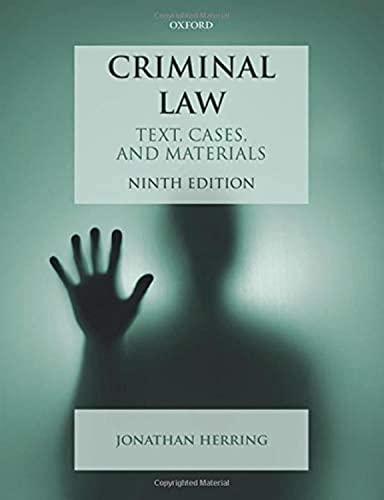Question
You arrive at the tribunal for the conciliation. There is a table with a desk and two chairs and a conciliator. The tenant is already
You arrive at the tribunal for the conciliation.
There is a table with a desk and two chairs and a conciliator.
The tenant is already there. He looks dishevelled and a bit angry.
The conciliator invites you to present the case to him and asks the tenant to listen.
The tenant is then invited to respond. He produces a letter from his doctor that says he has a chronic illness. He then presses the point that a forced move will be detrimental to his health and continuing will force him to live on the streets as he has nowhere else to go, no savings, no family or friends and has been unable to work.
Task 1 Discuss some protocols you will follow during the conciliation hearing.
For instance: Why is it important to be respectful to all parties? How would you show respect to the tenant?
Task 2 How would you ensure that your presentation meets the rules of evidence, for instance that it:
- is truthful and descriptive
- is devoid of assumptions or judgmental statements
- represents details and facts of the evidence that are pertinent to the case?
Task 3 The landlord has advised that the tenancy is to be ended and that it doesn't matter what the tenant offers, he needs the property to be empty so that he can sell it.
The conciliator asks you what concessions you might be able to make for the tenant.
- You understand the purpose and role conciliation, that it is to engage ina frank discussion about the complaint in an attempt to resolve the matter through negotiation.In this case you are not able to offer any concessions.
Script your answer in a few lines.
Task 4 The tenant realises that they will have to leave and agrees to do so on the due date. It is possible but not certain that there will be enough money in the bond to cover the cleaning etc , as you have not yet inspected the inside of the property. They agree to have the costs of the cleaning and unpaid rent taken out of their bond.
In a few lines, write up a summary of the agreed terms. Remember to put the names of the parties, the date and address of the property.
Question 3 The hearing - what to do
Assume that the matter above did NOT settle at conciliation - the tenant refused to accept the landlord's requirements. It proceeds to a hearing before a member of the tribunal.
Task 1 Why is a state or territory tribunal usually the most appropriate body to decide on tenancy disputes? Comment on Commonwealth and state legislation.
Task 2 Why would you have to disclose a copy of the agency agreement and lease in a hearing in a tenancy dispute?
Task 3 Comment on some ethical standards, protocols and court etiquette relating to presenting at hearings in real estate. Make your answer a summary of how you would approach a presentation at a hearing. How would these demonstrate respect for the court?
Task 4 Comment on procedures to be followed for presenting a case to a hearing. For example:
- on entering the courtroom
- during the hearing
- at the end of the hearing
Task 5 In the matter above, there were no expert witnesses although the tenant does produce the statement from his doctor about his illness. Why would the court admit this evidence and what is the role of expert witnesses?
Task 6 Why should an employee obtain from the court or tribunal a copy of the orders?
Task 7 How can the decisions of a judge, magistrate or tribunal member lead to an improvement in an agency's policies, procedures and practices?
Step by Step Solution
There are 3 Steps involved in it
Step: 1

Get Instant Access to Expert-Tailored Solutions
See step-by-step solutions with expert insights and AI powered tools for academic success
Step: 2

Step: 3

Ace Your Homework with AI
Get the answers you need in no time with our AI-driven, step-by-step assistance
Get Started


